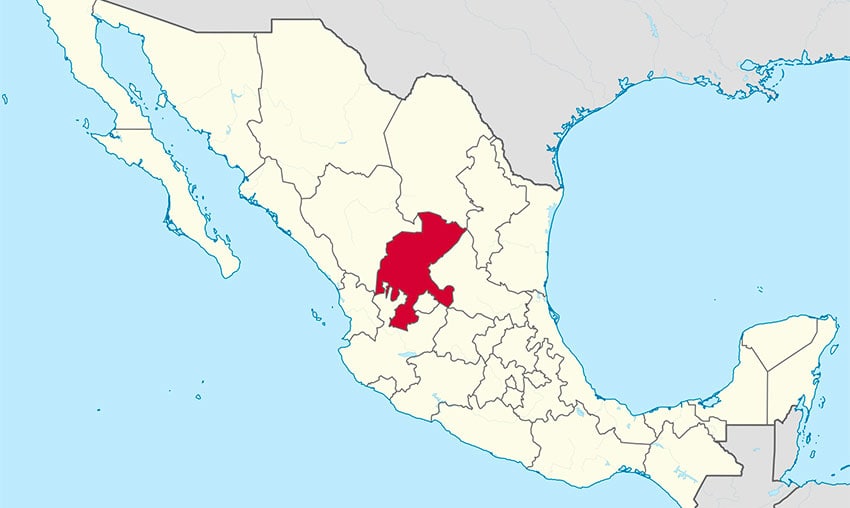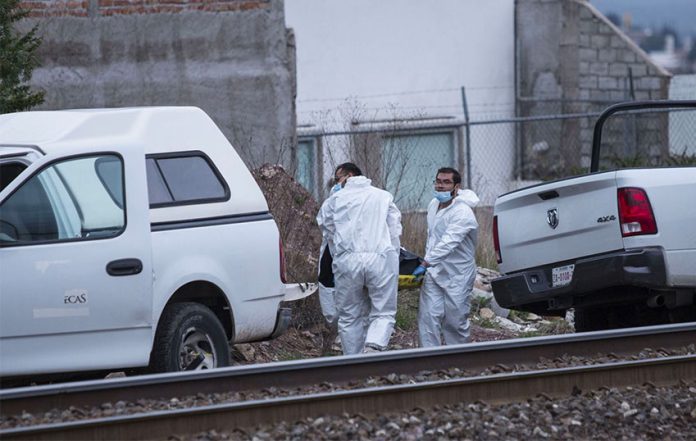A vicious battle for control of Zacatecas between Mexico’s two most powerful drug cartels continues with no clear end in sight.
The governor of the northern state, whose location between Pacific coast ports and Mexico’s northeastern border with the United States makes it a drug trafficking nexus, wrote to President López Obrador in February to seek federal government support because state and municipal security forces were outnumbered and outgunned by criminal organizations.
The Jalisco New Generation Cartel (CJNG) and the Sinaloa Cartel are engaged in a bloody turf war with each other in Zacatecas.
“With opposing organized crime groups as the protagonists, the fierce fight for the control of territory has placed our state in a grave security crisis,” Alejandro Tello wrote.
But if anything the situation today is no better.
Both the army and the National Guard operate in Zacatecas but they have been unable to rein in the rampant violence. The state was the seventh most violent in the country in the first five months of the year with more than 600 homicides, and the security situation has only worsened during the past two weeks.
On June 19, three bodies were found hanging from a bridge in Fresnillo, a municipality “overtaken” by organized crime, according to the mayor, while the bodies of two slain San Luis Potosí police officers were hung from an overpass in Zacatecas city on Wednesday of last week. Seven people were massacred by gunfire in a Fresnillo home the same day.
Two days later, a gunfight between the CJNG and the Sinaloa Cartel in the municipality of Valparaíso, which borders Fresnillo as well as the states of Jalisco, Nayarit and Durango, left at least 18 people dead. Local media reports placed the death toll as high as 35.
Two bodies were found hanging from trees on Tuesday of this week – one in Fresnillo and one in Valparaíso – while authorities on Wednesday located nine more bodies, all of which showed signs of torture.
Two bodies were found in black plastic bags in a street in Fresnillo, four were discovered wrapped in blankets in Zacatecas city and three were located on a dirt road in the municipality of Morelos, located just north of the capital. Two of the three bodies discovered in Morelos were “crucified” – impaled back to back on the same cross.
The nine murders are believed to be linked to the territorial dispute between the CJNG and the Sinaloa Cartel.

Security expert Eduardo Guerrero asserted that the federal government’s non-confrontational security strategy – the so-called abrazos no balazos (hugs, not bullets) approach – has allowed criminal groups to operate with impunity in states such as Zacatecas and Tamaulipas, where massacres recently occurred in Reynosa and Ciudad Miguel Alemán.
López Obrador has established a line of “no direct confrontation with narcos” that cannot be crossed, he told the newspaper El País, highlighting the contrast with the administrations led by former presidents Felipe Calderón and Enrique Peña Nieto, during which clashes between federal security forces and cartels were a “constant.”
Guerrero acknowledged that statistics show there has been a decline of massacres involving the army but charged that the cost of the non-confrontational strategy “has been enormous.”
“A number of areas have been left at the mercy of [organized] crime. This will generate more violence in the long term because there will be more competition [between criminal groups],” he said.
Guerrero also suggested that those groups are taking advantage of a political limbo between the June 6 elections and the swearing in of new governors in states such as Zacatecas, where David Monreal – who has urged Security Minister Rosa Icela Rodríguez to strengthen federal law enforcement – will take office for Mexico’s ruling Morena party later this year.
In the case of Tamaulipas, Governor Francisco García Cabeza de Vaca is not scheduled to leave office until late 2022 but it is unclear whether he will reach the end of his six-year term because federal authorities are pursuing him on organized crime and money laundering charges.
“Criminals take advantage [of political limbo] to carry out attacks because the chance of them going unpunished is very high. A lot of the time [criminal] groups aspire to [control] … a territory to sell or store drugs or to extort but they don’t [act to seize the territory] because the government is on their tail. But if they see [the government] as weak, they immediately carry out high risk tasks, like what happened in Reynosa,” Guerrero said.
With reports from El País and Informador
